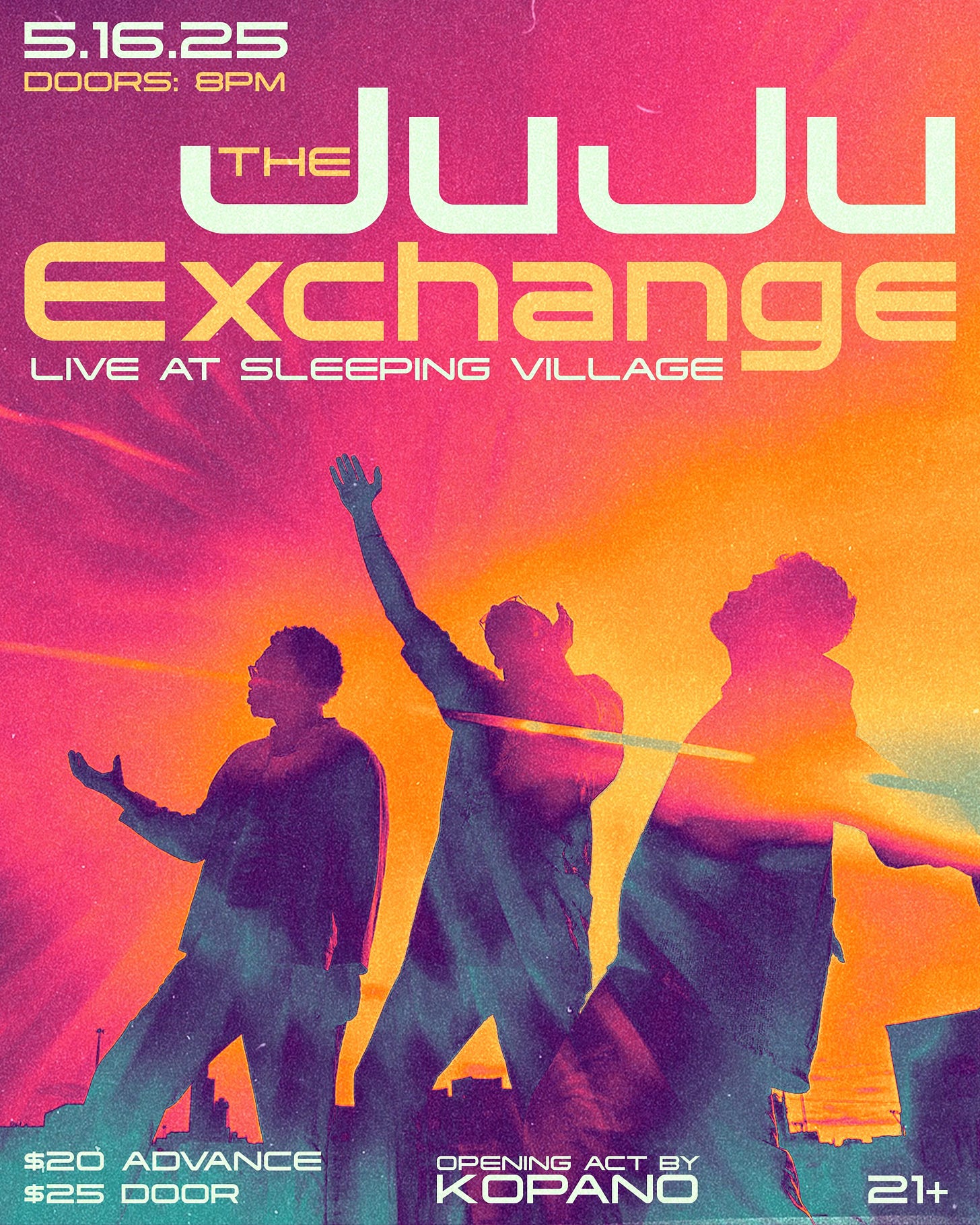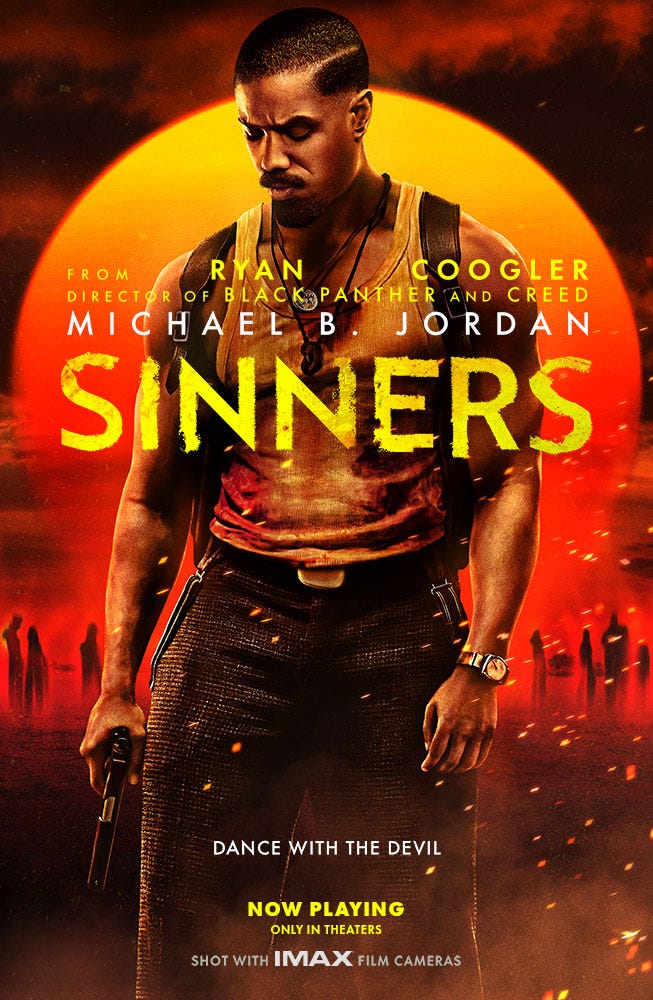
What’s good everyone,
For those in Chicago, I have a big ol’ show with The JuJu Exchange this upcoming Friday! We’re playing music off of our new album. Tickets here.
—
If you haven’t seen it, I invite you to consider viewing Ryan Coogler’s masterpiece Sinners, a film that strikes many, many chords in me around the complex entanglement of Black music, Christian faith, racial belonging in America. I have so many thoughts that I want to share that I’m breaking it up into two posts so it doesn’t feel like a boring essay lol. (There are many spoilers in what follows, so if you plan on watching it, feel free to come back to this after you’ve done so lol. But if vampires and gruesomeness isn’t your cup of tea, feel free to read on anyway.)
My thoughts aren’t all tied together, so I’ll just break them off into pieces.
Chicago and the South
The movie is all about the art of the deal, particularly the way Black folk have negotiated making deals in American society with White folk and with each other. The story centers on twin brothers who were gangsters, both played by Michael B. Jordan, who’ve returned to Clarksdale, Mississippi after spending time on the gangster scene in Chicago with Al Capone.
That decision to center on Mississippi and Chicago was significant for me because being a Black Chicagoan, I have seen just how many Black folk around me were directly from the South, especially Mississippi. It seemed like everyone at my childhood church - St. Mark UMC - was up from Jackson, Mississippi.
However, when I attended seminary in Atlanta, I met various Black Northerners in general and several Black Chicagoans in particular who had repatriated to the South. One of the Jordan’s characters in the film said at the beginning of the film that the twins wanted to come back home because they knew the Southern racism best. Besides, Chicago was just Mississippi with tall buildings instead of plantations.
While this comment was based on 1930s Black migration patterns, it also speaks to today. Sadly, Black Chicago has been slowly shrinking over the last little while as folk have moved (back) South, fed up with the city for various reasons, be it the disinvestment in Black neighborhoods and the crime resultant from that, the weather, or the price of living. (Charles Blow pitched repatriation to Black folk in a dynamic New York Times op-ed a few years ago as an attempt to help Black folk concentrate political power.)
I learned in seminary that any exposition of the past is really an exposition of the present. The gangster saying Chicago was just Mississippi without plantations underscored the importance of critically assessing Northern racial discourse that championed the North being superior to the South. The movie reminded me of all the Northern propaganda that paints the South in unfair broad brushstrokes as being backwards or inferior to the North. That is just not true. The South is a beautiful place, and its racist history may look different than the North’s, but (1) the North ain’t that much better, and (2) that racist history notwithstanding, Black culture is so rich in the South. I am forever grateful my wife and I bore witness to that while living there for four years before we moved to Chicago.
Black Music as the Devil’s Music
Sammie the preacher boy was a blues player and one of the protagonists in the story. He was a Black boy coming-of-age who loved blues guitar. However, he was condemned by his father, a conservative Christian preacher, for playing that devil’s music. His father warned him that the devil would follow him home if he kept playing that music, an admonition that would prove true when the White vampire Remmick emerged on the scene.
But before we get to Remmick and his congregation (next post), it’s worth sitting some more with Sammie. In seminary I studied the fraught relationship between the Black church and jazz, and learned that many Black folk saw the music as devil’s music in part because of its association with the club scenes that were emerging as cultural hubs of power that countered the church’s grasp on Black folk in the late 19th and early 20th centuries. Prior to that era, the Black church was the most formidable institution that housed Black expressive culture, including institutionalized music culture. But by the 20th century, like Sinners depicts, Black folk started owning clubs. Black musicians like Sammie would often play the jook joint on Saturday night and then church in the morning. The institutions may have had different moral visions - the sensuality of the blues club versus the piety of the church - but both relied on Black musicians to bring their respective worlds to life.
This was Thomas Dorsey’s tension, the most prominent progenitor of Gospel music, who brought the genre to life in my hometown Chicago. Dorsey was initially a Blues cat, known as Georgia Tom, but he wanted to bring the Blues into the church because he saw God in both. Ironically, his journey into the church began in the 1920s, and he got underway with Gospel in earnest by the 1930s, right when Sinners was set. Whether Coogler intended it, Sinners is set within a sea change (pun intended) within Black church musical life. Dorsey’s introduction of the blues, that sensual music of the club, into Sunday morning worship was frowned upon by many, (a typical response for changes in church music), but eventually would be embraced. I’m thankful to stand in that legacy as a Black musician who seamlessly moves between the church and club (as my recent releases show, BUST and Notes of Rest Hymns, Vol. 1).
What I found saddest about the movie was that the church was seen as intolerant of Sammie. The church could not imagine life with Sammie, and so they made him choose. I understand why Coogler did that, because many musicians then and now have felt the need to choose between church and the world, but it’s a sad binary that does not tell the whole story of Black life.
That said, when debriefing the movie with a dear pastor-friend of mine, Rev. Josh Williams, I was convicted of how little the critique of the church bothered me. Because I almost never see churches shown favorably in modern Hollywood, I’ve given up on us being portrayed favorably in high-quality cinema like a Coogler production. (Sure there’re cheesy Christian movies, but those are boring to me.) I’m used to Black churches being raided for our vibrant music and impassioned preaching, and I’ve grown used to having greater society generally ignore or downplay the power that inheres in life together formed within the life of Jesus. To be sure, I recognize that there’s grave religious trauma that the church must confront, and that there are generations of young people who will at best see the Black church as a benign relic of an American past or at worst see it as a menace to society worthy of censure and erasure.
So while I loved the movie’s redemption of the so-called devil’s music as a place for sacred communion in Black life, I mourned that this retrieval came at the expense of a fulsome view of Black religious life. Moreover, the fact that it didn’t even bother me on the front end until various pastor friends mentioned it was just a reminder that I need to bring my pessimism about depictions of the church to God. As Christian life wanes in power and prominence in the US, what should I hope our representation will be in cinema? Should (Black) Christians desire good representation at all, or just be more concerned about doing the work of the ministry?
To this point, I’ll close with a Catholic litany that I find too challenging to pray because of how it messes with my sense of self-esteem. And yet it is a prayer that does not go away. Instead, I keep sparring with it. Perhaps you’ll spar, too:
O Jesus, meek and humble of heart,
Hear me.
From the desire of being esteemed,
Deliver me, O Jesus.
From the desire of being loved,
Deliver me, O Jesus.
From the desire of being extolled,
Deliver me, O Jesus.
From the desire of being honored,
Deliver me, O Jesus.
From the desire of being praised,
Deliver me, O Jesus.
From the desire of being preferred to others,
Deliver me, O Jesus.
From the desire of being consulted,
Deliver me, O Jesus.
From the desire of being approved,
Deliver me, O Jesus.
From the fear of being humiliated,
Deliver me, O Jesus.
From the fear of being despised,
Deliver me, O Jesus.
From the fear of suffering rebukes,
Deliver me, O Jesus.
From the fear of being calumniated,
Deliver me, O Jesus.
From the fear of being forgotten,
Deliver me, O Jesus.
From the fear of being ridiculed,
Deliver me, O Jesus.
From the fear of being wronged,
Deliver me, O Jesus.
From the fear of being suspected,
Deliver me, O Jesus.
That others may be loved more than I,
Jesus, grant me the grace to desire it.
That others may be esteemed more than I,
Jesus, grant me the grace to desire it.
That, in the opinion of the world, others may increase and I may decrease,
Jesus, grant me the grace to desire it.
That others may be chosen and I set aside,
Jesus, grant me the grace to desire it.
That others may be praised and I go unnoticed,
Jesus, grant me the grace to desire it.
That others may be preferred to me in everything,
Jesus, grant me the grace to desire it.
That others may become holier than I, provided that I may become as holy as I should,
Jesus, grant me the grace to desire it.
abundantly,
Julian
What’s Next
May 9 w/ Zach Finnegan (Wausau, Wisconsin)
May 13 Solo piano at Back of the Yards Library Branch, 2111 W. 47th Street (Chicago)
May 14 Julian Davis Reid & Circle of Trust at Dorian’s (Chicago)
May 16 The JuJu Exchange at Sleeping Village (Chicago)
May 17 w/ Zach Finnegan at Andy’s (Chicago)
May 24 Solo piano at 2pm at Budlong Library Branch, 5630 N. Lincoln Ave. (Chicago)
May 30-31 Notes of Rest Inaugural Retreat (Oregon, Illinois) SPOTS STILL OPEN!
July 14-18 Notes of Rest Hybrid Class at Vancouver School of Theology
Recent Releases
BUST (Music Inspired by the Original Play from Zora Howard)
Sunlike (from The JuJu Exchange) (Apr 2025)
Notes of Rest Hymns, Vol. 1 (Apr 2025)
The Last Days of Cabrini Green (Music from the Audible Original) (from me, Feb 2025) (Listen to the Audible Podcast here)
Somebody Caught Me (from The JuJu Exchange, Feb 2025)
When Souls Cry Out (from me, Jan 2025)
Job Descriptions (email me for more info)
Pastor of Congregational Care at Plymouth UCC (Des Moines, IA)





What a magnificent review! As usual you have knocked it out of the park. And that Catholic Litany—sheesh! It resonates AND repels. Thank you for sharing it.-ZDB